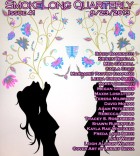I don’t want to dwell on your age, but you’re seventeen! What has your writing journey been like so far? And what are your plans?
Haha, yes; seventeen! The awkward age when you’re no longer a minor, not yet an adult, and cannot successfully pass as young enough to get the kids’ menu. Anyways, I would categorize my journey in writing as a progressive one. The longer I let experiences sit with me, the more I grow as a writer. It makes me a bit boring and plenty pensive. But I’m proud of where I am on this journey so far. This past summer I attended the Yale Writer’s Conference as well as the Iowa Young Writer’s Studio, and being in the company of other writers has been wonderful. I plan to invest myself in that kind of community when I go to college, and will pursue an MFA afterwards. And after that, I plan to do what I do now: write. And drink coffee.
Amorn says, “I want a simple life but it horrifies me that I have one.” This statement surprised me, as I would not have thought of this life as simple.
Amorn’s image of a simple life is a wholesome one. But then she is thrust into this world of perverse monotony day in, day out. Every night she is made to look extravagant and in all their excitement, her clients treat her tenderly. At the end of a day’s work, Amorn feels everything she does is formulaic. She clocks in and out, for example. She sits in the fishtank and is called up by her number. While I agree with you—Amorn’s lifestyle is anything but simple—she believes that a life led by such a disturbing formula is, in effect, as simple as a “wholesome life.” The fact that she’s asking for what she thinks she already has unsettles her.
The story feels like it is less about the murder of Amorn, and more about the protective mechanisms we employ to deny our own death. Is that a fair description?
Absolutely. Amorn’s death breaks the monotony of the brothel and makes for a great deal of introspection among the girls. As they are questioned by the police, they dissect the details of the actual death, but as they piece it together themselves, they are confronted with the unhappy truth that their deaths are happening too, and not just in the physical sense. These girls want to be oblivious to the degradation they are put through, but when one of their friends actually dies, it is as if they, in at least this one moment, cannot deny it anymore.
What do you like to read? Who are your influences?
Hmm…the spectrum of what I read is pretty broad. I love Toni Morrison, Jhumpa Lahiri, and Jonathan Safran Foer. Each of these authors have nuanced, original ways of getting emotion across. In Morrison’s work I find myself feeling the weight of her characters’ burdens before they enter scenes; in Lahiri’s, everything is tense and driven by the minutia of actions, and in Foer’s, there are just some drop dead beautiful passages with humor as well as heaviness.



 The core workshop of SmokeLong Fitness is all in writing, so you can take part from anywhere at anytime. We are excited about creating a supportive, consistent and structured environment for flash writers to work on their craft in a community. We are thrilled and proud to say that our workshop participants have won, placed, or been listed in every major flash competition. Community works.
The core workshop of SmokeLong Fitness is all in writing, so you can take part from anywhere at anytime. We are excited about creating a supportive, consistent and structured environment for flash writers to work on their craft in a community. We are thrilled and proud to say that our workshop participants have won, placed, or been listed in every major flash competition. Community works.